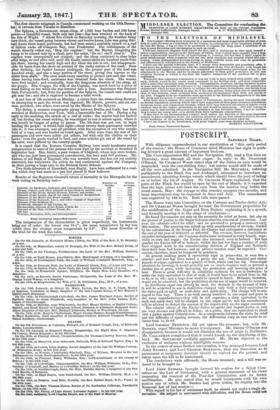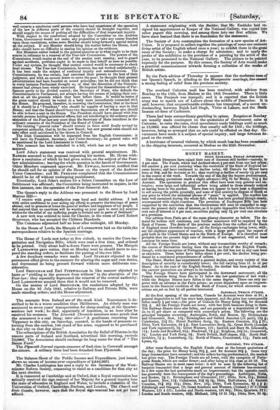POSTSCRIPT.
SATURDAY NIGHT.
With diligence unprecedented in our recollection at " this early period of the session," the House of Commons aided Ministers last night in push- ing forward a great amount of important business.
The Corn-importation Bill and the Navigation Bill, read a first time on Thursday, went through all their stages:- • In reply to Mr. STAFFORD O'BRIEN, Sir CHARLES WOOD stated that all the duties on corn would be suspended, even the one-shilling duty; bit entries would still be made of all the corn admitted. In the Navigation Bill, Mr. MITCHELL reing ferr particularly to the Black Sea and Archangel, attempted to introduce amendment, admitting foreign vessels which should leave the port of lading on or before the 1st of August Sir CHARLES WOOD explained, that the of the Black Sea would be open by the end of March: it is expected that the high prices will draw the corn from the interior long before the season, May: the voyage to this country occnpies two months, and large importations may be expected in June and July. The amendment was negatived by 188 to 55. Both bills were passed.
The House went into Committee on the Customs and Excise-duties Act; and Sir CHARLES Woon brought forward the Government proposition for the modification of the Sugar and Rum Duties; explaining it in a speech, and formally moving it in the shape of resolutions—
He based the measure not only on the necessity for relief at home, but also on the ground of justice to the Sugar Colonies after the removal of protection. Last year, the colonists asked for relief; and he promised to propose a measure early
this session. The question was mixed up with considerations of revenue. Guided by the calculations of Sir Robert Peel, Sir Charles had anticipated a deficiency at the end of the year of 300,0001. or 400,0001. The revenue, however, has hitherto
exceeded anticipations: the Customs-duties have increased in every branch, espe- cially on corn and sugar; the Excise also increased, even in Ireland. But last quarter the Excise fell off in Ireland; within the last few days a number of mills have stopped work in the manufacturing districts of England and Scotland; there have been bad harvests; and an adverse reaction must be expected. Con- cession, therefore, must be tempered by prudence.
At present malting grain is excessively high in price-84a. or even 88s. a quarter; and beer has been raised a penny the pot. One hundred and eighty
pounds of sugar, equivalent to a quarter of malt, would cost 75s. 6d. Were sugar
admitted for brewing, it would probably not so much displace malt as prevent a farther rise of price, while increasing the production and lowering the price of
beer. There is great difficulty in admitting molasses for use in breweries: to make the duty equivalent to that on malt, it would have to be raised from 5s. 8d, to 88. or 98. 8d.; and a large door would be opened to fraud. Molasses, therefore, would not be admitted; but the prohibition on the use of sugar would be removed. In distilleries sugar can already be used, the obstacle is the amount of duty. It will be admitted to use in distilleries chargedonly with a duty equivalent to
the sums paid on spirit as malt-duty and spirit-duty. The change will be ma- naged in this way. There is no wish among 'distillers to use sugar and grain in the same manufactories—they will be left separate; a duty equivalent to the malt and spirit-duty will be charged on the sugar spirit; and the manufacturer will be allowed to deduct the amount of the import-duty on the sugar consumed.
The relative effects of the Excise-duties on spirits and import-duties on ram are very obscure and difficult to define: at a guess, they are equivalent to about
10d. a gallon against Colonial rum. As a compromise between the claim for relief and the difficulty of sparing revenue, the differential duty oh rum would be re- duced from Is. to 6d.
Lord GEORGE BENTINCK did not oppose the measure; but, with Mr. BANREs, urged Ministers to make it temporary. Mr. SMITH O'BRIEN was disappointed, because it would not diminish the use of grain in distilleries. Mr. C.ALLAGHAN complained that it would knock up the distilleries of Ire- land. Mr. GouLnuRN cordially approved. Mr. HumE objected to the exclusion of molasses without intelligible reasons.
In the course of some further conversation, it was arranged between Lord JOHN RUSSELL and Lord GEORGE BENTINCK, that the discussion RS to permanent or temporary duration should be waived for the present, and taken upon the bill to be introduced. The resolutions were affirmed; the House resumed; and a bill was-or- dered to be brought in.
Lord JOHN RUSSELL brought forward his motion for a Select Com- mittee on the Law of Settlement, with a general statement of his views. respecting the renewal of the Poor-law Commission and its future modification. He also stated that he would incorporate with his own motion one of which Mr. Bankes had given notice, for inquiry into thn Removal Act of last session— With regard to the law of settlement itself, he should not maks a single ob- servation: the subject is surrounded with difficulties, and the House could nett
well corne to a conclusion until persons who have had experience of the operation of the law in different parts of the country should be brought together, and should supply the means of probing all the difficulties of that important inquiry.
With respect to the re,solntions adopted by the Committee on the Andover Union, Government would not make any proposition or take any course founded upon those resolutions, unless some Member should bring forward a special motion on the subject. If any. Member should bring the matter before the House, Lord John should have no difficulty in stating his opinion on the evidence. But Ministers rather looked to the general question as to what ought to be their course in reference to a renewal of the Poor-law Commission. The powers of the Commission would expire at the end of the session next ensuing; and to guard nainst accidents, provision ought to be made in that behalf as soon as possible. Under any system, he thought that central control would be necessary to check local abuses. The Poor-law Commission, however, has not worked satisfactorily; it has been made the subject of continual inquiry and animadversion. The Commissioners, he was certain, had exercised their powers to the best of their judgment, and with an earnest desire to serve the poor: he thought their general administration had been founded on sound principles; but he did not think that in every instance Parliament thought so or that the discretion of the Commis- sioners had always been wisely exercised. He imputed the dissatisfaction of Par- liament partly to the divided control; the Secretary of State, who defends the Commissioners in Parliament, not always having the means of judging their con- duct on all the grounds which they have before them. It would be better if the great control should be vested in a body more immediately connected with the Howe. He proposed, therefore, in renewing the Commission, that at the head of it should be a "President," who should be capable of having a seat in that Howe; and that the Board should have two Secretaries, one of whom also should be able to have a seat in the House. The President should have placed with him certain persons holding ministerial offices, but not interfering in the ordinary admi- nistration of the Poor-law any more than the Secretary of State interferes in the ordinary concerns of the President of the Board of Control. The existing "general rules" should remain in force until finally revised by competent iunlionty, that is, by the new Board; but new general rules should not take effect until sanctioned by the Queen in Council. The Irish Commission will be separated from the English Commission: it will have its President, Secretary, and Under-Secretary; its general rules will be sanctioned by the Lord-Lieutenent in Council. This measure has been embodied in a bill, which has not yet been finally Matured.
_. Lord John's statement was received with general acquiescence. Mr. Remus assented to the proposal respecting his motion. Mr. HUME with- drew a resolution of which he had given notice, on the subject of the Poor- law administration • leaving the whole question in the hands of Government. Other Members expressed approval. Mr. ErwaLL, however, notified that he should call for an opinion of the House on the report of the Andover Union Committee; and Mr. FERRANJD complained that the Commissioners should be let off without undergoing punishment.
Eventually, Lord John's motion for a Select Committee on the Law of Settlement was affirmed; the Committee being instructed to inquire, in the first instance, into the operation of the Poor-Removal Act.
The Queen's reply to the Address was presented to the House by Lord Marcus Hill-
" I receive with great satisfaction your loyal and dutiful address. I look with entire confidence to your aiding my efforts to preserve the blessings of peace abroad, and to promote at home the general welfare and happiness of my people. I feel assured that no exertions will be wanting on your part to meet my anxious wishes for the relief of my suffering people in Ireland and in parts of Scotland." A new writ was ordered to issue for Chester, in the room of Lord Robert Grosvenor, who has accepted the Chiltern Hundreds.
The Commons adjourned half an hour after midnight, till Monday.
In the House of Lords, the Marquis of LANSDOWNE laid on the table the correspondence relative to the Spanish marriage.



























 Previous page
Previous page